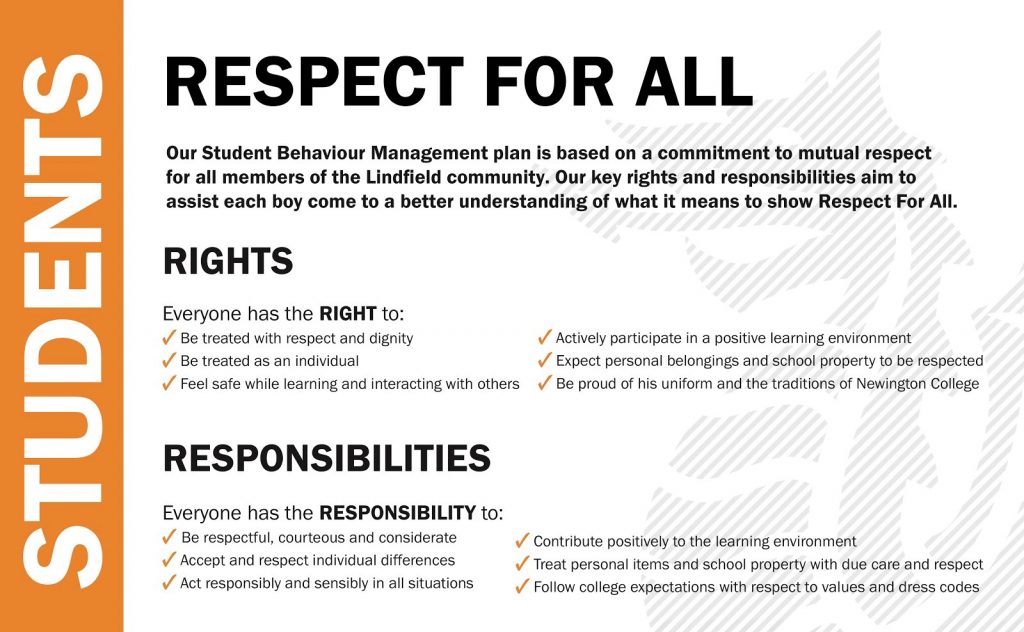Pastoral Care
Pastoral Care at Lindfield (including Student Behaviour Management)
Pastoral care is not merely a complementary practice; it is policy and practices fully integrated throughout the teaching and learning and structural organisation of a school to effectively meet the personal, social (wellbeing) and academic needs of students and staff.
To this end we have a robust and consistent approach to student behaviour management that values the rights of every member of the school community and highlights the responsibilities that accompany these rights.

The School’s Philosophy of Pastoral Care
Newington College’s overall aim is to provide a well-balanced liberal education, nurturing the physical, emotional, social, moral, academic and spiritual needs of the students, and assisting them to grow towards the full stature of responsible citizenship. As a central component of this aim, the school seeks to provide a supportive environment for boys, where individual needs are recognised and the pursuit of excellence is valued. This is done with the recognition that we have a sound understanding of the needs of boys and what works best for them.
Pastoral care at Newington focuses on the total development of each student and enhancement of the dignity of each person. It nurtures success and has a commitment to forgiveness, tolerance and reconciliation. As teachers, we seek to motivate young people to be socially responsible and committed to building a better world through a partnership of the school community, teachers and parents.
To assist in facilitating a supportive, positive and affirming environment, it is important that expectations, both academic and behavioural are clear, and rules and limits are set. Every member of the community has responsibility to contribute to achieving such an environment. Therefore, an effective Behavioural Management Policy is viewed as an essential component of a genuine approach to Pastoral Care. This works in conjunction with the School’s overarching Anti-bullying Policy.
Valuing Individuals
At Lindfield, we acknowledge that people respond to genuine praise and positive recognition. We also recognise that learning best takes place in an environment that is supportive and caring, is encouraging of risk taking and where all are valued and individual needs are met. This positive approach greatly contributes to the enhancement of each child’s self-esteem. Children who have a positive self-concept and sense of self-esteem feel worthy, valued and resilient and are ready to succeed.
All children should be actively encouraged to participate in the many opportunities that are provided both within the classroom and through the rich co-curricular program. The talents and capacities of each child should be nurtured and their efforts and achievements recognised. As students develop and mature, they should be guided towards becoming self-motivated and life-long learners. From this perspective, pastoral care can assist students to develop positive self-esteem, healthy risk taking, goal setting and negotiation, thus enhancing their strengths and other protective factors contributing to their resiliency as well as developing a sense of social cohesion that together can improve their overall health and wellbeing.
Students are encouraged to understand and value others (Mark 12:30-31), work cooperatively and be guided towards stable and satisfying interpersonal relationships. As all children are unique they should be encouraged to be individuals and their uniqueness should be viewed as an asset.
Valuing Each Other
As a teaching community at Lindfield, we feel it is important to build positive relationships with our students based upon mutual respect and trust. We endeavour to provide students with a stimulating, challenging, enjoyable and supportive learning environment. As teachers, we believe that all students can learn and as such we have appropriately high expectations of students. We aim to support each individual within the classroom, academically and behaviourally, and encourage each student to take responsibility for his actions. The relationship between each teacher and each student is of great importance in achieving this aim. This is supported by recent research that suggests that one of the most significant aspects influencing students’ learning is this relationship. The health and wellbeing of students is increasingly being attributed to school conditions, school relationships, means of fulfilment, and health status.
Communication
To encourage mutual respect, we believe it is essential to treat all members of our community with integrity. This includes talking to others in an appropriate manner, listening to their concerns and dealing with them appropriately, be they students, staff or parents. At Lindfield K-6, there is a strong understanding that parents know their children best and have the right to be involved in their child’s education. The development of a strong partnership between parents and teachers is an important aspect of the educational and pastoral process at Lindfield.
We feel it is essential that staff and parents work together to foster each child’s development so that he may grow towards an appreciation both of himself and of his place amongst his peers.
Our Pastoral Care Policy for Lindfield together with the school’s overarching Anti-Bullying Policy can be found on the Policies Page on our Lindfield SPACES site.
Mr Pascal Czerwenka – Deputy Head of Campus






